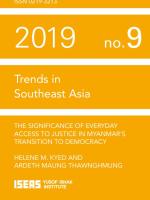The significance of everyday access to justice in Myanmar’s transition to democracy
Access to justice is crucial to the attainment of peace and development, according to the UN and other international agencies. If people believe that adequate mechanisms are in place to provide such access, they are more likely to trust and approve of the post-conflict ordering of their society. The need for access to justice not only means addressing flagrant large-scale injustices, such as past atrocities and the deprivation of rights, albeit very important; securing access to justice in the everyday is also necessary. This ‘Trends in Southeast Asia’ paper, written by DIIS senior researcher, Helene Maria Kyed and Professor Ardeth Thawnghmung, focuses on everyday justice in the Myanmar transition, based on extensive field research. It provides five interlinked arguments:
- Legal pluralism in Myanmar is a reality that is not sufficiently recognized.
- A lack of recognition of and clear mandates for the informal justice providers, along with the absence of coordination between these providers and the judiciary, present critical challenges to local dispute resolution and informal legal systems.
- This results in a high level of unpredictability and insecurity concerning the justice outcomes and in the underreporting of cases. The lack of jurisdictional clarity represents an even greater challenge in areas of mixed control and where numerous armed actors are present.
- Discussion of reform of the justice sector in Myanmar and debates surrounding peace negotiations and the role of the ethnic armed groups in service provision are separated. This situation reinforces the divide between ceasefire areas and the rest of the country and raises concern that the improvement of justice systems will leave conflict-affected populations behind.
- Recognition of and support for community-based dispute resolution are crucial to reducing the escalation of conflict at the local level. Justice systems like those of ethnic armed groups can contribute significantly to stability and order at times when the official system has limited territorial reach and is mistrusted by civilians.
DIIS Experts



